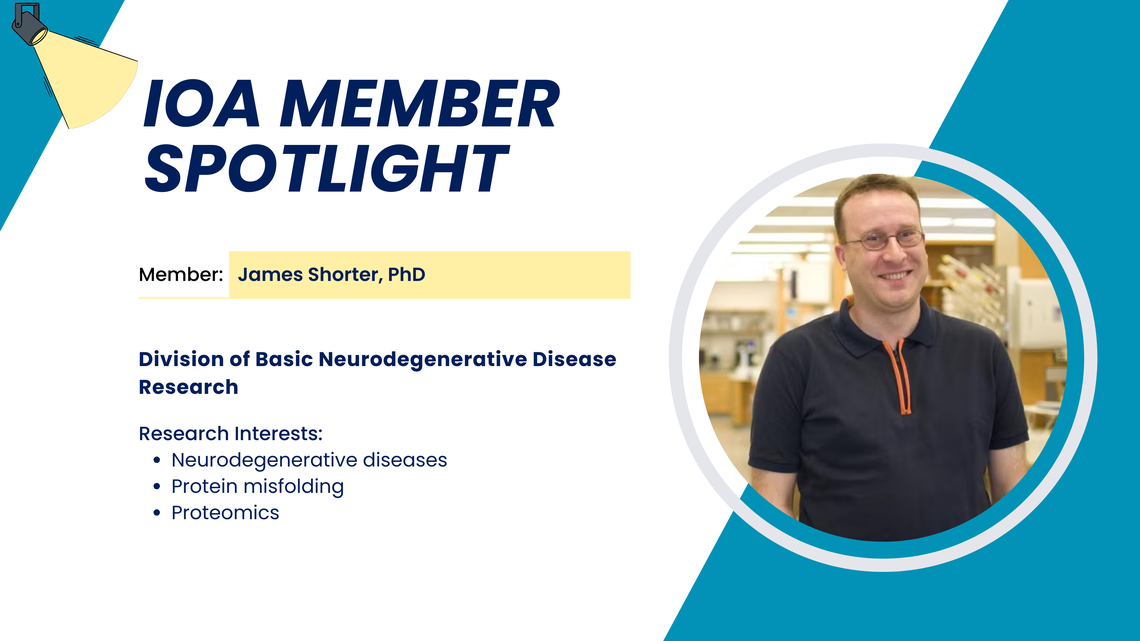
James Shorter, PhD is a Professor of Biochemistry and Biophysics in the Perelman School of Medicine at the University of Pennsylvania. The Shorter lab studies how to counter deleterious phase transitions in neurodegenerative disease.
In 2024, Dr. Shorter and his team received the Zenith Fellows Award from the Alzheimer’s Association, which is among the most prestigious awards in Alzheimer's research worldwide, as well as an award from the Kissick Family Foundation in partnership with the Milken Institute Science Philanthropy Accelerator for Research and Collaboration and an award from Hop On a Cure with the Robert Packard Center for ALS Research.
Q: How does your work contribute to our broader understanding of the aging process or neurodegenerative diseases like Alzheimer’s or Parkinson’s?
A: "Neurodegenerative diseases and other protein-misfolding disorders represent a longstanding biomedical challenge, and effective therapies remain largely elusive. This failure is due, in part, to the recalcitrant and diverse nature of misfolded protein conformers. Many aggregation-prone proteins undergo aberrant phase separation events, which are difficult for neurons to reverse and elicit toxicity. My research program aims to combat diseases caused by toxic protein states by exploiting or enhancing the proteostasis machinery to prevent and reverse pathological protein conformations. In this way, we hope to inform and develop therapeutic strategies for various neurodegenerative disorders."
Q: How could your findings potentially impact real-world applications or solve specific problems?
A: "By understanding how to reverse aberrant protein states, we can nominate therapeutic approaches for neurodegenerative disease. For example, in recent studies (Aikio et al. 2025) we have found that p38α MAPK inhibition reduces pathological TDP-43 phosphorylation, aggregation, cytoplasmic mislocalization, and neurotoxicity, which are connected to amyotrophic lateral sclerosis (ALS) and frontotemporal dementia (FTD). Importantly, a clinical stage, brain-penetrant p38α small-molecule inhibitor, VX-745, is poised to be advanced to clinical trials for these disorders."
Q: How important is collaboration in your research? Are you working with any other research groups/centers at Penn?
A: "Collaboration is critical to answer big questions and advance science in the most impactful, multidisciplinary way. We collaborate with many superb labs all over the world and enjoy excellent collaborations with many cutting-edge labs at Penn with diverse expertise, including Xiaolu Yang, Ophir Shalem, Lukasz Bugaj, Defne Amado, Beverly Davidson, Sandra Maday, Lijun Zhou, Yi-Wei Chang, Liz Rhoades, Kathy Liu, Yale Goldman, Julia Warren, Sílvia Porta, Virginia Lee, Donna Huryn, George Burslem, Ben Black, and Nancy Bonini."
Q: What’s next for you in terms of future projects or research directions?
A: "We are excited to continue to elucidate mechanisms by which small molecules (Aikio et al., 2025), short RNAs (Copley et al. 2024), and protein disaggregases (e.g., engineered Hsp104 disaggregases [Lin et al. 2024]) can be utilized to reverse adverse phase-separation events in neurodegenerative disease."
Recent Publications

